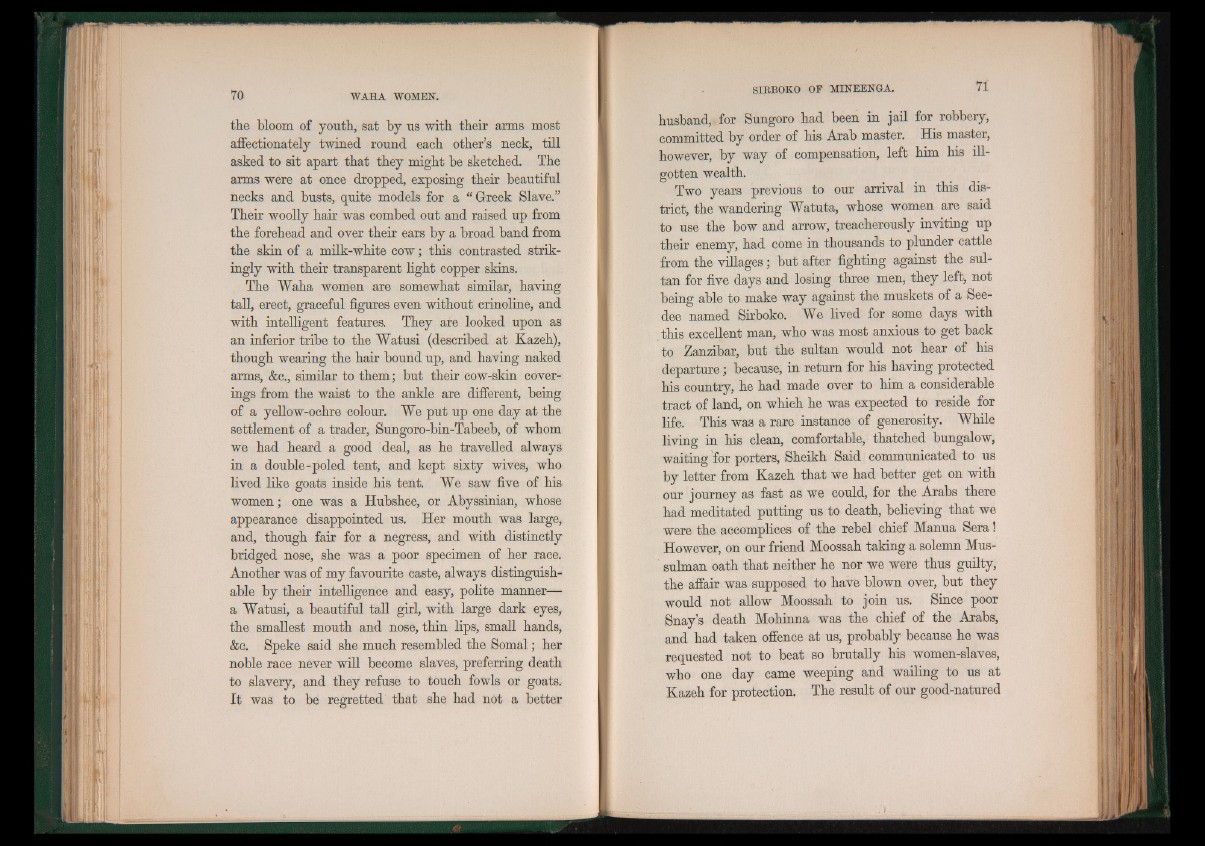
the bloom of youth, sat by us with their arms most
affectionately twined round each other’s neck, till
asked to sit apart that they might be sketched. The
arms were at once dropped, exposing their beautiful
necks and busts, quite models for a "Greek Slave.”
Their woolly hair was combed out and raised up from
the forehead and over their ears by a broad band from
the skin of a milk-white cow; this contrasted strikingly
with their transparent light copper skins.
The Waha women are somewhat similar, having
tall, erect, graceful figures even without crinoline, and
with intelligent features. They are looked upon as
an inferior tribe to the Watusi (described at Kazeh),
though wearing the hair bound up, and having naked
arms, &c., similar to them; but their cow-skin coverings
from the waist to the ankle are different, being
of a yellow-ochre colour. We put up one day at the
settlement of a trader, Sungoro-bin-Tabeeb, of whom
we had heard a good deal, as he travelled always
in a double-poled tent, and kept sixty waves, who
lived like goats inside his tent. We saw five of his
women; one was a Hubshee, or Abyssinian, whose
appearance disappointed us. Her mouth was large,
and, though fair for a negress, and with distinctly
bridged nose, she was a poor specimen of her race.
Another was of my favourite caste, always distinguishable
by their intelligence and easy, polite manner—
a Watusi, a beautiful tall girl, with large dark eyes,
the smallest mouth and nose, thin lips, small hands,
&c. Speke said she much resembled the Somal; her
noble race never will become slaves, preferring death
to slavery, and they refuse to touch fowls or goats.
I t was to be regretted that she had not a better
husband, for Sungoro had been in jail for robbery,
committed by order of his Arab master. His master,
however, by way of compensation, left him his illgotten
wealth.
Two years previous to our arrival in this district,
the wandering Watuta, whose women are said
to use the bow and arrow, treacherously inviting up
their enemy, had come in thousands to plunder cattle
from the villages; but after fighting against the sultan
for five days and losing three men, they left, not
being able to make way against the muskets of a See-
dee named Sirboko. We lived for some days with
this excellent man, who was most anxious to get back
to Zanzibar, but the sultan would not hear of his
departure; because, in return for his having protected
his country, he had made over to him a considerable
tract of land, on which he was expected to reside for
life. This was a rare instance of generosity. While
living in his clean, comfortable, thatched bungalow,
waiting for porters, Sheikh Said communicated to us
by letter from Kazeh that we had better get on with
our journey as fast as we could, for the Arabs there
had meditated putting us to death, believing that we
were the accomplices of the rebel chief Manua Sera!
However, on our friend Moossah taking a solemn Mussulman
oath that neither he nor we were thus guilty,
the affair was supposed to have blown over, but they
would not allow Moossah to join us. Since poor
Snay’s death Mohinna was the chief of the Arabs,
and had taken offence at us, probably because he was
requested not to beat so brutally his women-slaves,
who one day came weeping and wailing to us at
Kazeh for protection. The result of our good-natured